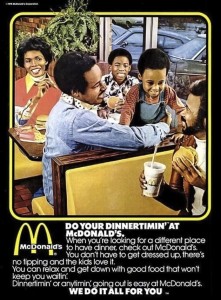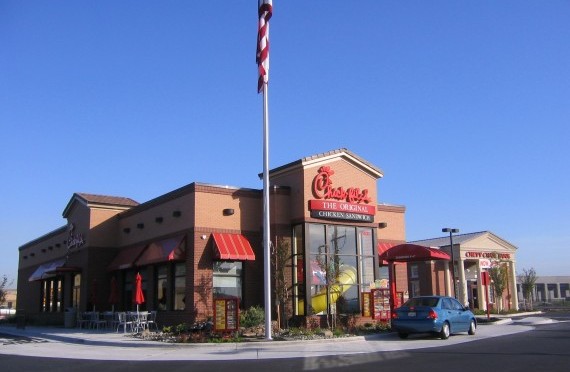James Kirkpatrick
VDARE
July 7, 2015
A national survey shows Chik-fil-A is the most popular fast food company in America, with McDonalds the least popular. The press is troubled by the findings.
It’s official: despite its controversial politics, America’s favorite fast food chain is Chick-fil-a.
The annual American Consumer Satisfaction index polled 70,000 people for their opinions on various consumer offerings, including fast food. In its first year on the index, the Southern-born, Christian-run sandwich chain debuted at the top.
And way at the bottom was the once-mighty but increasingly beleaguered McDonald’s.
[America’s favorite fast food chain is Chick-fil-a while McDonald’s is at the bottom of the heap in new survey, Daily Mail, July 5, 2015]
Controversial to whom?
 What’s interesting is that the two companies have internalized far different approaches to defining their identity. McDonald’s is “365 Black” and proudly defines itself as a diverse company perfectly suited for the new, majority-minority America. (Right, an ad they ran in Ebony Magazine, as long ago as 1976.) Not surprisingly, the formerly iconic American fast food chain is now best known for serving as a kind of low rent gladiatorial arena, where the denizens of America’s ghettos battle it out and give each other brain damage. Even the employees get in on the action occasionally.
What’s interesting is that the two companies have internalized far different approaches to defining their identity. McDonald’s is “365 Black” and proudly defines itself as a diverse company perfectly suited for the new, majority-minority America. (Right, an ad they ran in Ebony Magazine, as long ago as 1976.) Not surprisingly, the formerly iconic American fast food chain is now best known for serving as a kind of low rent gladiatorial arena, where the denizens of America’s ghettos battle it out and give each other brain damage. Even the employees get in on the action occasionally.
Chik-fil-A in contrast, is known as a Southern, Christian company. Employees are told to be polite and attentive to customers and restaurants tend to be located in conservative areas. Not surprisingly, it was targeted for destruction a few years ago, with mayors in Boston, San Francisco, and Chicago actually trying to ban the restaurant. Illegal immigrants can murder your citizens and the forces of law and order slumber peacefully, but if a CEO says gay marriage isn’t the greatest thing in the world, local government leaps into action. For now, it appears efforts at boycotts and economic terrorism have failed, but who knows what the future holds?
The real question—if diversity is so bad for business, why are CEO’s eager to roll over for it?
 Daily Stormer The Most Censored Publication in History
Daily Stormer The Most Censored Publication in History



